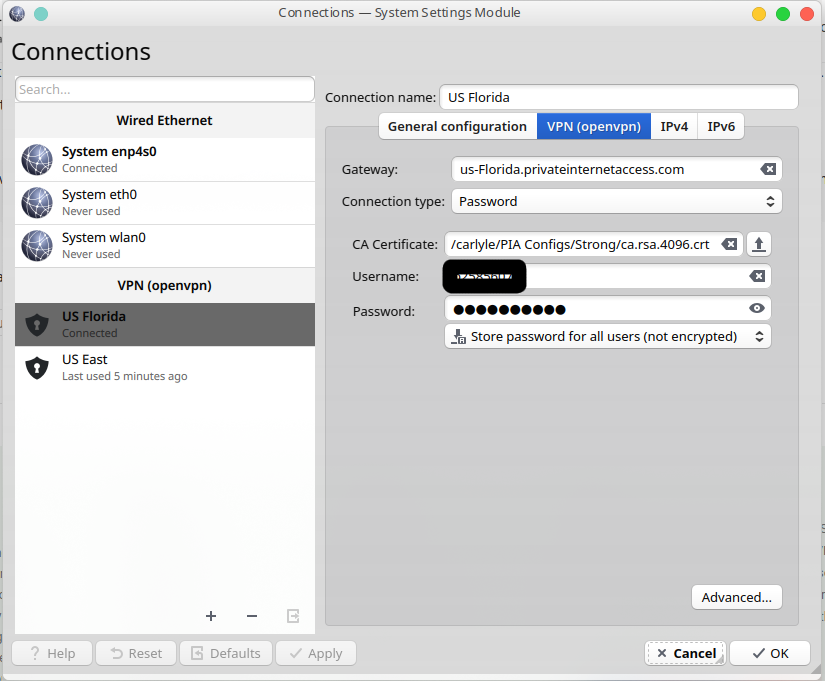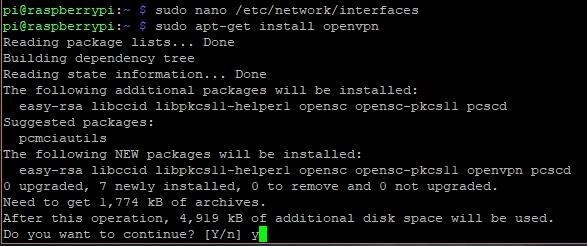

- Pia vpn client raspberry install#
- Pia vpn client raspberry manual#
- Pia vpn client raspberry android#
- Pia vpn client raspberry software#
Pia vpn client raspberry manual#
Now you need to set up port forwarding on the router to send UDP traffic that arrives at a particular port to the IP address you just reserved for the VPN server.Īgain, the exact steps vary from router to router, so you may need to track down the manual for your device. If you get stuck, use a search engine to find the manual for your device. The exact steps vary from router to router, though it’s generally just a simple matter of logging in and configuring the DHCP settings. If this isn’t configured already, you can do it in your router’s dashboard. Your Raspberry Pi VPN server should be allocated a reserved IP address, so that it will always be found at the same address on the local network.
Pia vpn client raspberry install#
Configuring Your VPN’s Routerīefore we install Wireguard, we need to tell your router where to send the VPN traffic when it arrives. PiVPN actually offers two options that meet these needs: OpenVPN, which is well established and widely supported, and Wireguard, which is newer and offers great performance.

As such, we want it to run there too.įor this project we’ll use a script called PiVPN, which makes installing a VPN server on a Raspberry Pi dead simple.
Pia vpn client raspberry android#
There’s a good chance that your client is something different: perhaps a Windows, Mac or Android device.
Pia vpn client raspberry software#
Our Raspberry Pi runs a version of Linux on top of an ARM architecture, so our server software needs to support this. The server sits on the network you want to connect to and can accept connections from multiple clients. The client goes on your phone, laptop or other device that you’re traveling with. VPN software has two parts – the client and the server. This is something of a middle option that mixes the benefits of both. It’s worth noting that you can also install your own VPN server somewhere in the cloud. That’s especially true if there’s nobody back home to switch it back on again. This will be a bother if you’re halfway around the world and you need it to access something. There’s a small chance of something like a power outage or SD card corruption knocking it offline. It makes more sense there to choose a commercial service used by many others.Ī Raspberry Pi VPN serer won’t offer foolproof reliability.

On the other hand, if your reasons for wanting a VPN involve top secret activity that you don’t want traced back to you, hosting a VPN server on your home network is a terrible idea. When you sign up to a service, what do you really know about it? This risk can be mitigated by using a reliable service, but make sure you do your homework first to avoid bad actors. If that network is your home or office, then – hopefully – you have some understanding and control of what goes on there. Despite common misconceptions, using a VPN doesn’t totally remove the risk of malicious actors spying on you, it just shifts it to another network. That gives you access to your file server, your media centre, even to print documents on your printers. The big advantage is of a VPN server on your local network is that it’s where you connect to. It’s near impossible to know how well someone else’s wireless network is configured, or who else might be on it.īy encrypting all your traffic and sending it elsewhere, nobody else on your local network can see what you’re sending or where you’re sending it. This means that VPNs are very useful when you travel. Some of that might be sensitive, like passwords or financial information. Everyone on your network can see all the traffic you send and receive. Most wireless networks use encryption, but it’s usually only for people unconnected to the network. It’s a secure, encrypted connection over the internet that connects you to a private network somewhere else. Decided you need a VPN? It’s easy enough to rent one for a monthly fee, but with just a Raspberry Pi and a bit of know-how you can build your own VPN server! What is a VPN? Why Have One?


 0 kommentar(er)
0 kommentar(er)
